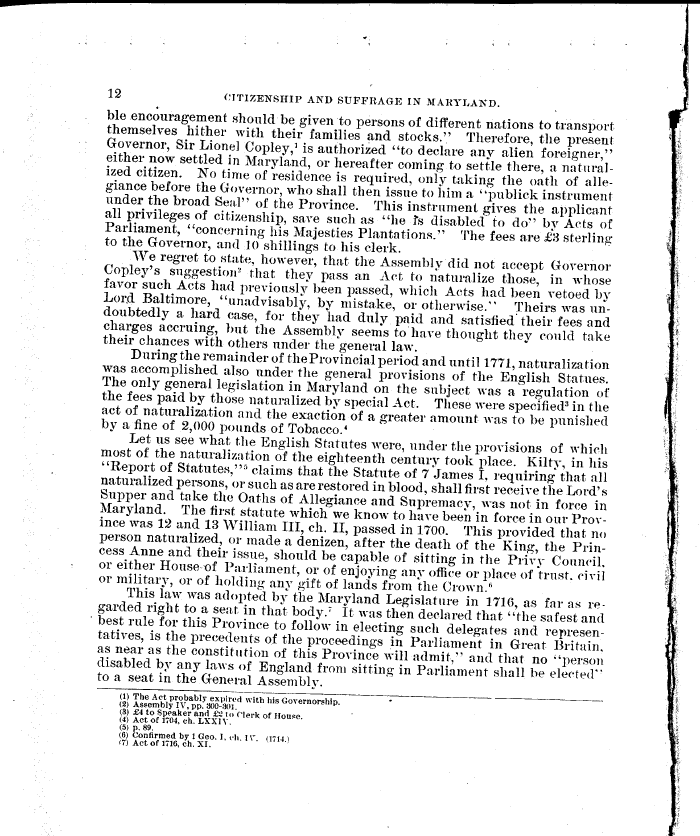|
12 CITIZENSHIP AND SUFFRAGE IN MARYLAND.
ble encouragement should be iven to persons of different nations to
transport
themselves hither with their` families and stocks." Therefore, the present `
Governor, Sir Lionel Copley,' is authorized "to declare any alien
foreigner,"
either now settled in Maryland, or hereafter coming to settle there, a
natural-
ized citizen. No time of residence is required, only taking the oath of alle-
giance before the Governor, who shall then issue to him a "pllblick
instrument
tinder the broad Seal" of the Province. This instrument gives the applicant
all privileges of citizenship, save such as "lie is disabled to do" by Acts
of a
Parliament, "concerning Iris Majesties Plantations." The fees a .re £:3
sterlin(),-
to the Governor, anti l0 shillings to his clerk. '-
ęT e regret to state, however, that the Assembly did not accept Governor
Copley's suggestion' that they pass an Act to naturalize those, in whose
favor such Acts had previously been passed, which Acts had been vetoed by
Lord Baltimore, "unadvisably, by mistake, or otherwise." Theirs was Un-
doubtedly a hard case, for they had duly paid and satisfied their fees and
charges accruing, but the Assembly seems to have thought they could take
their chances with others under the general law.
During the remainder of theProvincia1period and until 17'71, naturalization
was accomplished also under the general provisions of the English Statues.
The only general legislation in Maryland on the subject was a. regulation of
the fees paid by those naturalized by special Act. These Nvere specified 3
in the
act of naturalization and the exaction of a greater amount was to be
punished
by a fine of 2,000 pounds of Tobacco.'
Let us see what tile English Statutes were, under the provisions of which
most of the naturalization of the eighteenth century took place. Kitty, in
his
"Report of Statutes,", claims that the Statute of 7 James I, requiring that
all
naturalized persons, or such as are restored in blood, shall first receive
the Lord's 'i
Supper and take the Oaths of Allegiance and Supremacy, was not. in force in '
Maryland. The first statute which we know to have been in force in our Prov-
ince was 12 and 13 William III, ch. II, passed in 1700. This provided that
no
person naturalized, or made a denizen, after the death of the King, the
Prin-
cess Anne and their issue, should be capable of sitting in the Privy
Council,
or either Rouse-of Parliament, or of enjoying any office or place of trust,
civil
or military, or of holding an- gift of lands from the CroNl-n.'
This law was adopted by' the Maryland Legislature in 1710, as far as I-e-
garded right to a seat in that. body.? It was then declared that "the
safest and
best rule for this Province to follow in electing such delegates and
represen-
tatives, is the precedents of the proceedings in Parliament in Great.
Britain,
as near as the constitution of this Province will admit," and that no
`person
disabled by any laws of England front sittin:; in Parliament shall be
elected"
to a seat in the General Assembly.
(1) The Act probably expired %vith his Governorship.
(2) Assembly IV, pp. 300-;jot.
(3) £4 to Speaker and £:> 1o Clerk of House.
(4) Act of 1704, ch. L7ia 1 \ .
(5) p. 89.
Confirmed I, ch. il-. (114.)
(7) Act ofe6,gl
|

